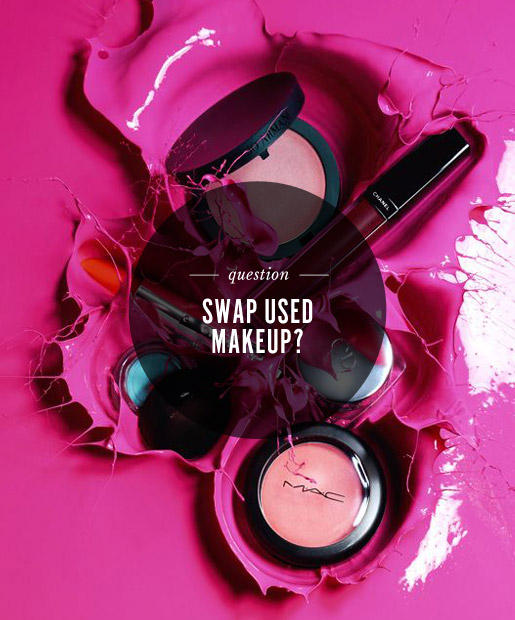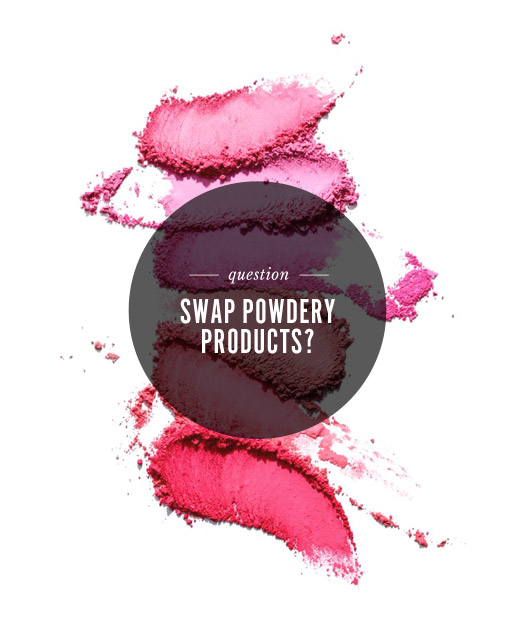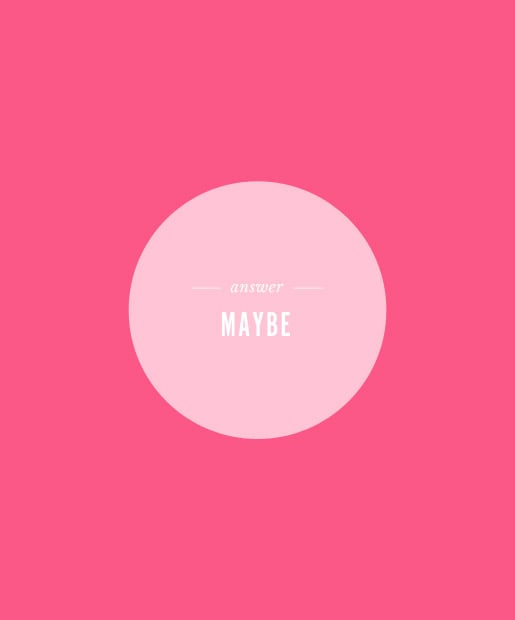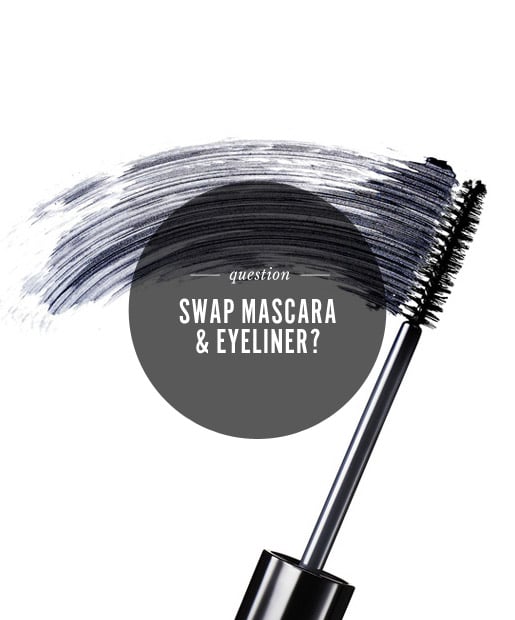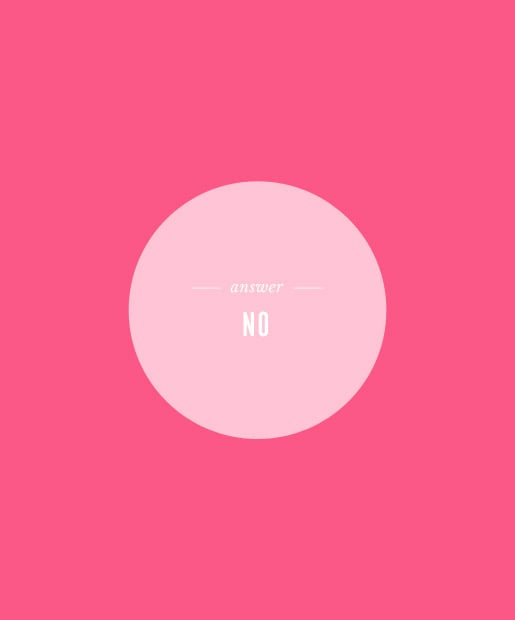Reddit is a great resource for many things: Discovering new memes, uncensored interviews with celebs (Snoop Dogg is a fan of K Pop, FYI) and, believe it or not, scoring sweet makeup deals. Yep, this stripped-down dude bulletin board is also home to the Makeup Exchange, a forum where users can sell, request and even swap products for free. Picked up the wrong shade of M.A.C. foundation? No problem, Julie in Montana will trade you for her Stila lipstick in Phenomenal. Sounds like a makeup junkie's dream ... except for one teensy, tiny, problem: The majority of products being passed around have all been used.
Although the forum's rules prohibit the sale or swap of used makeup and old nail polish, they are accompanied by a link to this tutorial on how to disinfect your used makeup before you sell or swap it. New rules require all users to post pictures of their products and state how many times they've been used. This is supposed to offer peace of mind, knowing starrynightgirl's lipstick is "used the most, but less than 10 times," only makes me more paranoid. But here, in this land of voracious makeup swapping, no one else seems worried about a minor thing like hygiene. Instead, the forum's users are more concerned with whether a shade is truly "Caramel" as opposed to "Bronze Tan" and how much they are going to have to pay for shipping.
But after extending the question, "Would you swap used makeup?" to our Facebook fans, I know I'm not alone in my squirming -- many of you were not down with swapping with strangers (or in some cases even your closest friends), but others had some ifs and buts in their reasoning. What did health experts and cosmetics chemists have to say about your advice on swapping used makeup? We investigate.
Although the forum's rules prohibit the sale or swap of used makeup and old nail polish, they are accompanied by a link to this tutorial on how to disinfect your used makeup before you sell or swap it. New rules require all users to post pictures of their products and state how many times they've been used. This is supposed to offer peace of mind, knowing starrynightgirl's lipstick is "used the most, but less than 10 times," only makes me more paranoid. But here, in this land of voracious makeup swapping, no one else seems worried about a minor thing like hygiene. Instead, the forum's users are more concerned with whether a shade is truly "Caramel" as opposed to "Bronze Tan" and how much they are going to have to pay for shipping.
But after extending the question, "Would you swap used makeup?" to our Facebook fans, I know I'm not alone in my squirming -- many of you were not down with swapping with strangers (or in some cases even your closest friends), but others had some ifs and buts in their reasoning. What did health experts and cosmetics chemists have to say about your advice on swapping used makeup? We investigate.
"I'd swap used powder products if I know who they're coming from, because you can sanitize them. If you had a makeup artist do your makeup, she didn't buy the makeup to use on you only." - Darlene on TotalBeauty.com
Experts say: According to James Hammer, cosmetic chemist and founder of Mix Solutions in Uxbridge, Mass., these users are on the right track: Powder-based products, both loose and pressed -- think blushes, eyeshadows, compacts and finishing powders -- are low risk in the grand scheme of things because they're dry, which makes it hard for bacteria to multiply and spread (FYI, they prefer warm, moist environments). Plus, these products are usually applied to the cheeks and forehead, not infection-prone spots like the eyes and mouth.
But you're not entirely off the hook. Oils (and bacteria!) from your face, or your fellow swapper's face, are easily transferred to powder products, especially if you use one brush for multiple products, or are guilty of double dipping -- and who isn't? (You can't get a complete smoky eye in one swipe, after all.)
Experts say: According to James Hammer, cosmetic chemist and founder of Mix Solutions in Uxbridge, Mass., these users are on the right track: Powder-based products, both loose and pressed -- think blushes, eyeshadows, compacts and finishing powders -- are low risk in the grand scheme of things because they're dry, which makes it hard for bacteria to multiply and spread (FYI, they prefer warm, moist environments). Plus, these products are usually applied to the cheeks and forehead, not infection-prone spots like the eyes and mouth.
But you're not entirely off the hook. Oils (and bacteria!) from your face, or your fellow swapper's face, are easily transferred to powder products, especially if you use one brush for multiple products, or are guilty of double dipping -- and who isn't? (You can't get a complete smoky eye in one swipe, after all.)
The verdict: Maybe. Powdery products are low risk, but proceed with caution -- bacteria may be present, and the risk goes up if you add water, such as with an eyeshadow or cake eyeliner, and apply near more sensitive areas like your waterline.
"I think swapping some things [like nail polish] could be a good idea, and it's actually cleaner than nail salon polishes! Swapping things like mascara and eyeliner however ... you must have a death wish." - Tammy on TotalBeauty.com
Experts say: NYC dermatologist Dr. Ariel Ostad says previously used and shared oil-based and water-based eye products rank as the most dangerous, hands down. The most common makeup-sharing related infection he sees? Conjunctivitis, a.k.a. pink eye. "Not only is it extremely contagious, but people don't always know they're brewing it," Ostad told me. (Suddenly, I'm giving the side eye to everyone within my 10-foot proximity.) Oh, and there's also blepharitis, the inflammation of the super-sensitive eyelid. But that could be the least of your worries when swapping eye products.
Experts say: NYC dermatologist Dr. Ariel Ostad says previously used and shared oil-based and water-based eye products rank as the most dangerous, hands down. The most common makeup-sharing related infection he sees? Conjunctivitis, a.k.a. pink eye. "Not only is it extremely contagious, but people don't always know they're brewing it," Ostad told me. (Suddenly, I'm giving the side eye to everyone within my 10-foot proximity.) Oh, and there's also blepharitis, the inflammation of the super-sensitive eyelid. But that could be the least of your worries when swapping eye products.
Not to get all "you're gonna go blind" panicky, but Dr. Edward Kondrot, the director of the Healing The Eye & Wellness Center in Dade City, Fla., says if even the smallest particle of infected makeup gets lodged inside your eye next the cornea, it can be "devastating." Devastating as in ... you're gonna go blind. It's rare, but it happens. "Pseudomonas, an infectious bacteria, is of most concern since it grows in a moist environment and can lead to a serious corneal ulcer," says Dr. Kondrot. How does a pesky case of pinkeye jump to losing your sight for good? "A closed eye acts as a bacterial incubator," says Kondrot. A comforting thought as you drift off to sleep tonight.
The verdict: No. These are high risk, avoid at all costs.
The verdict: No. These are high risk, avoid at all costs.


